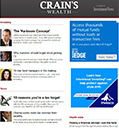
A new report by Morningstar Inc. casts new doubt on the relative cost advantages of ETFs over comparable mutual funds.
The research firm looked at a number of factors that contribute to the total cost of an index-tracking fund — from expense ratios to trading costs to tracking difference — and delivered a resounding answer to the question of which type of fund is cheapest.
The answer: It's complicated.
Advertisement
The report analyzed a limited set of mostly plain-vanilla mutual funds and exchange-traded funds that tracked similar indexes and could be easily compared and found that the list price of ETFs — as measured by a simple average of their expense ratios — were lower in 2013 than mutual funds. The average large-blend ETF examined by Morningstar charged 0.13%, compared with 0.72% for retail share classes of similar mutual funds and 0.39% for institutional share classes.
But that tells just a sliver of the story.
A simple average ignores the fact that many advisers and investors are cost-conscious shoppers.
When the average was adjusted to account for where investors put their money — an “asset-weighted” number, to be technical — ETFs were less attractive than institutional share classes in categories such as emerging markets, intermediate bonds and large blend.
In some cases, investors were also paying less in expenses for retail share classes of index funds.
VANGUARD TILTS RESULTS
The Vanguard Group Inc., which has a number of popular index funds, heavily tilted the results. When removing the index pioneer's funds from the equation, ETFs retained their relative advantage in all but one Morningstar category (foreign large blend) — even on an asset-weighted basis.
But a number of difficult-to-quantify factors such as trading costs and tracking difference may also shift the balance in favor of mutual funds.
ETFs are famous for a unique structure in which only institutional investors directly transact with the fund company; most investors buy shares of the funds in a secondary market on exchanges. That structure allows fund companies to create and redeem shares of the fund for the underlying securities, rather than cash, in a non-taxable transaction.
That fact is thought to have the effect — along with the fact that index-tracking portfolios tend to have less turnover than their actively managed counterparts — of limiting capital gains tax liabilities for their investors.
This report may give more support to that argument. Using a methodology explained in greater depth in the paper, the firm calculated a five-year tax cost ratio percentage in U.S. and international stock funds as well as in bond funds and found that the average tax cost for ETFs was much lower in stock funds — 0.37% for ETFs compared with 0.72% for mutual funds tracking U.S. stocks — and about identical for bond funds.
But on another measure, ETFs didn't stack up as well. The firm used a measure — also described in greater depth in the paper — to calculate the carrying cost or cost of holding ETFs and mutual funds, primarily made up of the difference in returns between funds and their underlying index.
On an asset-weighted basis, ETFs had a higher “estimated holding cost” in U.S. and international stock funds, though not in bonds, over one- and five-year time periods. And the cost of trading, like the bid-ask spread or the tax on brokerage commissions, can also add substantially to those funds' costs.
The analysts offer a number of suggestions, including suggesting that ETFs may do better for investors invested over a longer period of time and in taxable accounts. But some of their suggestions will be more controversial, including focusing on ETFs with “at least $500 million in assets” or with an average daily trading volume of at least $1 million. The analysts said doing so could limit the costs of trading.
“There is no reason to consider a $500 million AUM or $1 million average daily volume threshold to invest in an ETF,” said Grant Engelbart, a portfolio manager at CLS Investments and a major buyer of ETFs. “If you believe in the philosophy, process and exposure of the index/ETF, there is no reason to wait for it to grow to adequate size.”
Mr. Engelbart said readers should keep in mind that there is a very small universe of index mutual funds, and that they tend to be “much less expensive” than their actively managed counterparts.
The report offers a reminder that the total cost of an investment is far more complicated than their marketing or expense ratio may suggest.










